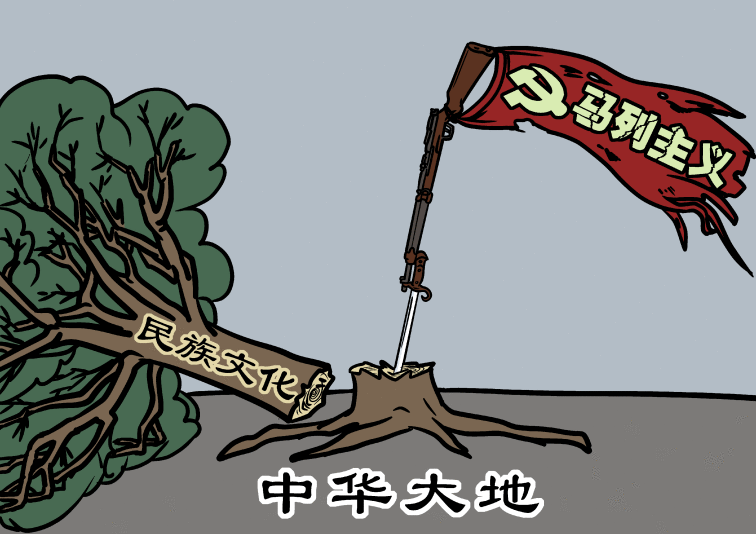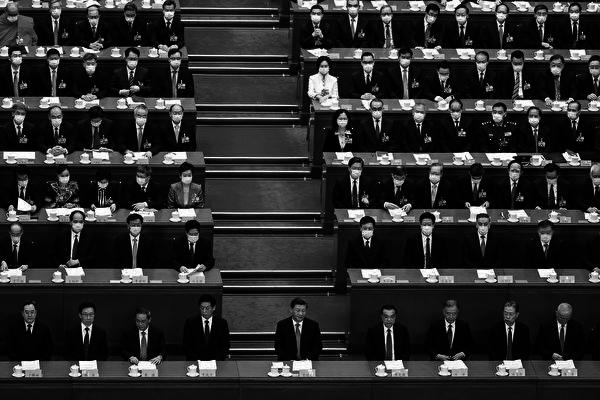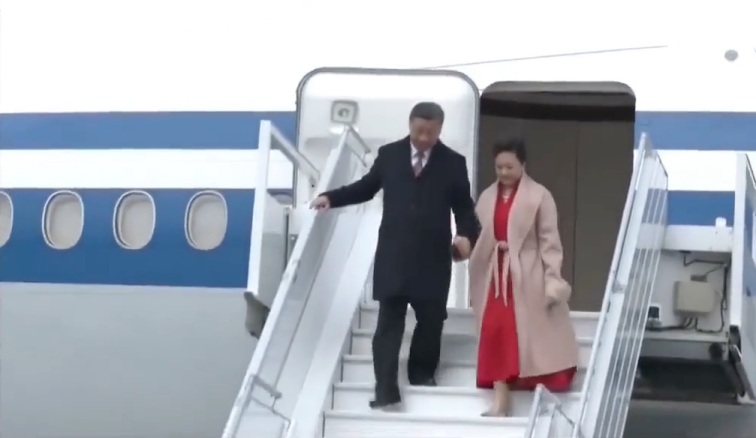Screenshots from the CCP's Peking Opera Song of the Dragon River. (Video screenshot)
[People News] 3. Escaping from Beneath the Bluestone
From the time I was three or four years old, I often had a terrifying recurring dream: I was falling headfirst into a deep, black abyss. I couldn't scream, I couldn't stop myself, and I would struggle for a long time before I woke up crying—or be woken by my mother. Sometimes in the dream, I would be flying endlessly, and upon waking, I would inexplicably sob and weep uncontrollably.
By the time I was four or five, my golden hair had gradually turned black. I was cheerful by nature. I enjoyed solitude and quiet, but also loved following behind my third brother, climbing trees and rooftops. My favourite game was playing "eagle catches the chick" with them, feeling the thrill of being caught and the joy of narrowly escaping—it made me utterly happy. When Grandma told us stories, I would listen intently, crying or rejoicing for the characters. I often sat down with a pile of my third brother’s picture books, reading for hours. These experiences gradually shaped an independent personality in me. When I grew up, my mother would often say, “You were the least trouble of all the children.”
One summer evening when I was four years old, I was sitting at the edge of the roof ridge, completely absorbed in a picture book. Just then, my eldest brother came home from school. Grandma told him to go up to the roof and block the chimney. After adjusting the chimney cover based on the wind direction, he casually tossed an extra-large bluestone brick from the roof’s edge. These old-style bricks were thick and heavy. The brick fell directly toward my head. At the very last moment, it somehow tilted and sliced the back of my head with one sharp corner before hitting the ground with a heavy thud. Blood gushed from my scalp instantly. I jumped up and burst into terrified sobs. At that exact moment, my mother had just returned from work. Hearing my unusual crying, she rushed over, pressed on my wound, scooped me up, and ran to the hospital.
They had to shave part of my head, and the doctor stitched the wound with three sutures. The doctor said, “This little girl just escaped death. If that brick had landed even slightly more toward the centre of her head, it would have cracked her skull. She wouldn’t have survived.”
I went home with my head wrapped in bandages, carried in my mother’s arms. From then on, my mother would often hold my little hand and stroke the raised round “whorl” on my palm. Even when I grew up and came home to visit, she would still wordlessly take my hand or foot and examine those two whorls countless times. I never understood what was so special about them. Whenever I asked, she would reply thoughtfully, “It’s a sign of good fortune.”
4. Quasi-Rightist — My Mother Under Investigation
In 1955, during the Anti-Counterrevolutionary Campaign, many teachers were persecuted. Before the smoke of that movement had even cleared, a new nationwide campaign began: the “Hundred Flowers Campaign.” That spring, Mao Zedong gave two major speeches. One was On the Correct Handling of Contradictions Among the People (February 1957), and the other was Speech at the National Propaganda Work Conference (March 1957). In the first, Mao elaborated on how to correctly manage internal conflicts among the people and emphasised the “Double Hundred Policy”—“Let a hundred flowers bloom, let a hundred schools of thought contend.” The second stressed the importance of “letting go” as the foundation of this policy. Mao sincerely claimed that the Communist Party was preparing for self-rectification, encouraging criticism of bureaucracy and the “Three Maladies,” and asked the people and Party to help out. His seemingly kind and gentle words and demeanor moved the nation, and a wave of enthusiastic free speech began.
At the time, my father, having experienced several prior political movements before 1957, had become a seasoned “veteran” of such events. He was highly alert to political campaigns and remained silent during the early stages of the Anti-Rightist Movement. Sure enough, he was soon targeted due to his family background, social connections, and a brief three-month stint as a Nationalist soldier. But he handled the situation with caution and composure.
One day, someone from the authorities called him in and said, “Old Zhang, people are raising many opinions during the campaign. Some say peasants can’t get enough to eat, and even chickens are starving to death. Others say the Soviet Red Army committed many wrongdoings while helping us in the war. What do you think of these views?”
My father replied carefully, “Since the ‘liberation,’ the lives of the vast majority of peasants have steadily improved. The exploiting classes have been eliminated. If chickens died, perhaps it was a poultry disease. As for the Soviet Red Army, we’re grateful they helped us fight. I haven’t seen or heard anything bad, so I wouldn’t make baseless accusations...”
The official continued to prod: “Would you say life is quite difficult right now?”
My father said, “Our living standards are constantly improving, and the future will be better...”
These “lure the enemy deep” tactics were widely used. But my father never took the bait, and in the end, he successfully avoided falling into the trap.
Mao later openly admitted in Volume Five of his collected works that the shift from encouraging open speech to suppressing dissent was a deliberate trap: “Lure the enemy in deep, then annihilate them.” My father narrowly escaped. But my mother, moved by the Party’s supposed sincerity—especially Mao’s—responded with heartfelt concern for the nation and spoke her mind freely, which brought disaster upon her. She was secretly labelled a rightist and became the subject of a formal investigation.
My mother was born in 1924. Though she came from a wealthy family, she never truly enjoyed its privileges. As war and chaos brought decline to the household, she eventually became a proletarian during the Communist “land reform and redistribution” movement, thus escaping that particular persecution. During those years, she was immersed in her studies. My grandmother shielded her from family matters to protect her from harm.
My mother admired the “May Fourth Spirit” and followed what was then considered progressive thought. She was both traditional and modern—a “new woman” of her time. Though my grandmother had raised her as a refined lady, skilled in poetry, painting, and music, the rising ideological tide swept her into Communist theory and its revolutionary zeal. She embraced all of it, throwing herself into the cause with abandon.
As a child, I remembered my mother playing her harmonica, making beautiful sounds that seemed to conjure green mountains and flowing streams. During the land reform era and the early “liberation” years, she played lead roles in revolutionary operas such as The Marriage of Little Erhei and The Bitter Grudge (The White-Haired Girl), becoming well-known for her performances. She also studied obscure ancient medical texts beyond her academic training and helped family and friends with her knowledge. She even delved into the Book of Changes and astronomy, seeking harmony between heaven and humanity. My mother was intelligent and well-read, with a meticulous mind. Yet, in politics, she was astonishingly naive—like a child who forgets pain after healing.
She threw herself into the “Hundred Flowers” campaign with the same passion as she had the revolutionary theatre, believing wholeheartedly in Mao’s words and the Party’s promises. But halfway through the “performance,” the tune changed. The conductors and accompanists went off-key, and it was too late for her to retreat. She had been ensnared by Mao’s trap. Simply because she gave her leaders some suggestions, she was labelled a “right-leaning, anti-Party element.” A special investigation was launched.
At that time, my father had already passed through the political storm unscathed. My mother, stunned by the sudden disaster, was overwhelmed with fear. My grandmother and father were deeply worried and tried to comfort her while looking for a solution.
I was still very young then, but the heavy atmosphere in our home was unmistakable. Though my parents tried to shield us, the hushed conversations and sombre mood made it clear that calamity had befallen our family.
During that time, my grandmother repeatedly warned my mother: “Just because you’re labelled a ‘poor peasant’ doesn’t mean you can afford to lose your head. Remember the Song and Liu families of old? Their kindness saved us during land reform—even those who knew our real background chose not to expose us, so we survived. But once investigations begin, nothing is safe. Don’t bring ruin upon us. Think of your six children. They need a safe and stable home, not harm brought upon them by our own missteps.”
By now, my mother could no longer cry “injustice.” All she could do was face the disaster in terror.
After graduating from a teacher’s training program in the Republican era, she had been teaching ever since. Her students included people older than her by decades, from all walks of life—her influence was widespread. She was young, dedicated, studious, progressive, and enthusiastic. Her teaching was frequently observed by educators at provincial, regional, and county levels. She was regularly honoured as a model worker or outstanding educator. She cheered for every so-called advancement of “New China,” and enthusiastically participated in every Party campaign. So, when she was suddenly accused of being “right-leaning and anti-Party,” it devastated her. She refused to admit it. She couldn’t understand: she had merely done what the Party and Mao had called for—how could that make her the enemy?
Looking back, she finally understood. Once Mao classified China’s educated class as “intellectuals,” they became regular targets of political campaigns. Aside from enduring false accusations and suffering, they were left with nothing, perhaps not even dignity or integrity. The pain of betrayal and injustice haunted my mother. She could not stomach such blatant deceit.
In the end, thanks to my father’s relentless efforts, the investigation against her was dropped. He had pulled her back from the brink of destruction. Our family was finally relieved, but my mother would live with lingering fear for the rest of her life.
After stumbling in the Anti-Rightist Movement, she never recovered. She distanced herself from politics, gave up on joining the Communist Party, and turned her focus to raising her six children. Toward the outside world, she adopted a posture of quiet endurance and detachment.











News magazine bootstrap themes!
I like this themes, fast loading and look profesional
Thank you Carlos!
You're welcome!
Please support me with give positive rating!
Yes Sure!